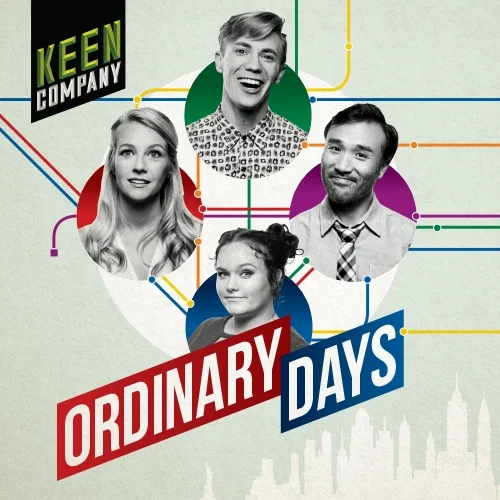REVIEW: “Midnight at the Never Get”
Harvey Fierstein’s acclaimed masterpiece “Torch Song” is currently in previews for its big return to Broadway.
But, there is another torch song under the radar that is also worth checking out this fall: York Theatre Company’s presentation of “Midnight at the Never Get”, a slick and gorgeous new musical about a forgotten sliver of gay history, featuring a book, music, and lyrics by 2018 Jonathan Larson Award Winner Mark Sonnenblick, and stellar direction by Max Friedman.
Set in an afterlife limbo resembling the smoky backroom haze of New York’s 1960s gay underground nightclub scene, “Midnight at the Never Get” is a fictional cabaret concert mediation on impossible love, revolution, music, and memory as singer Trevor Copeland (co-conceiver Sam Bolen in a breakout performance) recalls the story of his romance with songwriter Arthur Brightman, the apotheosis of which was their late-night club act—“the biggest act that didn’t exist”— at the illegal Greenwich Village gay bar the Never Get, matter-of-factly named: “Midnight at the Never Get”.
You see, according to Trevor, in this version of the afterlife, “you get to pick a memory. Make a little house out of it. Hang the walls and rough the floors with all the detail you have left. And then you stay, as long as you like, in your infinite moment, where you can be just like you were.” So, appropriately, he’s chosen the Never Get as he waits to be reunited with Arthur.
Perched atop a polished grand piano, a poof of otherworldly smoke surrounds the statuesque Trevor clutching a silver microphone in true Judy fashion as he begins the act, one now in perpetual rehearsal. Over the course of his show, a fabulist’s loving re-imagining of his once famed act—a version of the truth—we learn how he and Arthur met at the Checkerboard Lounge, fell in love over music, formed their act, and were ultimately torn apart by the chafe of political change and the tempt of success at the cost of the closet. What might be viewed as a simple cabaret act slowly transforms into something far more magical and poignant by evening’s end.
Jeremy Cohen and Sam Bolen. Photo Credit: Carol Rosegg.
While the Stonewall riots and subsequent gay liberation movement have become increasingly understood and appreciated, the specific milieu of 1960s gay New York in proto-revolution is less so. It is hard to believe today, but gay bars were illegal. They existed, sure, but largely as so-called “bottle clubs” run by the mafia under constant threat of police raid. In New York State, serving alcohol to homosexuals was de facto illegal since homosexuals were deemed “disorderly” by their very existence. That’s what made Dick Leitsch’s 1966 “sip-in” at Julius so momentous.
Against this backdrop, Trevor dares to sing Arthur’s tuneful ballads and witty ditties without changing the pronouns to assume a heterosexual stage persona, instead, performing them as a gay man, a small but revelatory act of resistance in a time permeated by fear and persecution. As white cis men, Trevor and Arthur were surely protected to some degree by their privilege, but arrests and violence against LGBTQ people were common in the era, and ultimately prove to be too much for Arthur to handle.
About “Arthur’s” songs it is remarked that one record producer said: “Cole Porter [wrote] these songs thirty years ago and better.” Far from derivative or pastiche, though, Mr. Sonnenblick’s compositions (orchestrated by Adam Podd for a tight, five piece band) are remarkably on par with those of Porter and his contemporaries—a treasure trove of new “lost songs” that easily evoke the spirit, sentiment, and elegance of a bygone era, and evince a craft and style few writers today possess.
As Trevor, Mr. Bolen is simply a knockout, delivering a dynamic, finely modulated, multi-layered, and deeply human performance. And his smooth, tenor voice is a dream. The pianist (Jeremy Cohen) at his side is a representational stand-in for Arthur who, from time to time, flickers with multiple iterations of similar dialogue, the result of Trevor’s flickering remembrances. “It’s what you learn when you get here,” Trevor remarks. “That your whole life was just a rehearsal for your memory.”
Jeremy Cohen and Sam Bolen. Photo Credit: Carol Rosegg.
This overall concept is a winsome and beautiful one, especially as realized on Christopher Swader and Justin Swader’s semi-immersive cabaret set, perfectly lit with showbiz glitz and ethereal precision by Jamie Roderick. It helps, too, that the York’s theatre is eminently intimate and, several stories deep underground, exists in its own sort of limbo.
In development since 2015, “Midnight at the Never Get” is easily the best new musical I have seen this season so far. It immediately struck me as calling for a summer production in Provincetown—a development I smiled to learn already happened in 2017. I hope this sweet and moving production is memorialized with a cast album, and that it finds continued life beyond this engagement ending on November 4th.
Bottom Line: “Midnight at the Never Get” is a cabaret concert mediation on impossible love, revolution, music, and memory; easily the best new musical I have seen this season so far, Sam Bolen gives a knockout performance as a gay cabaret singer recalling his romance in the smoky backroom haze of New York’s 1960s underground nightclub scene. This gorgeous show is not to be missed.
_______________
“Midnight at the Never Get”
York Theatre Company
At Saint Peter’s
619 Lexington Avenue
New York, NY 10022
Running Time: 90 minutes (no intermission)
Opening Night: October 11, 2018
Final Performance: November 4, 2018
Discount Tickets




